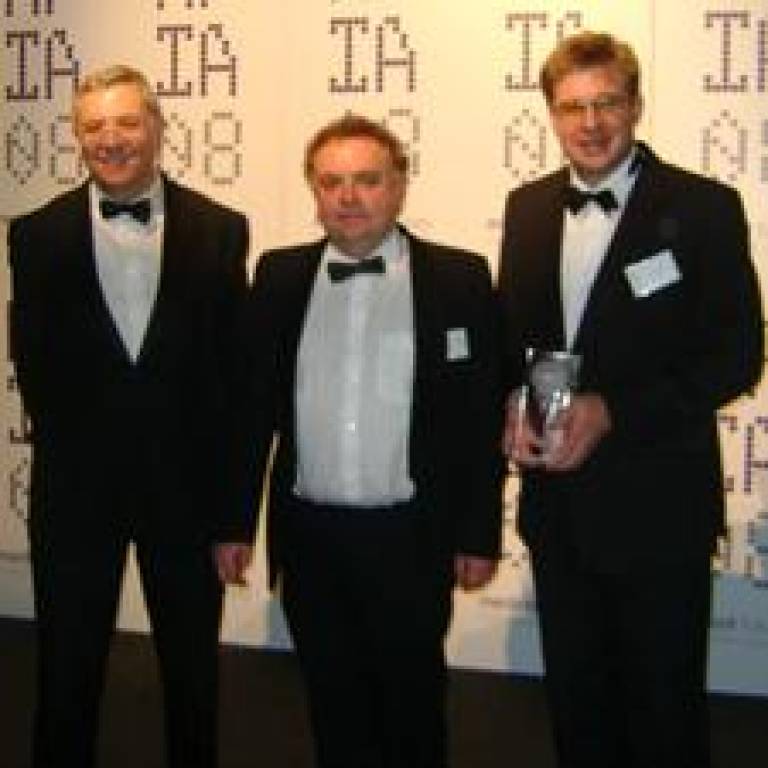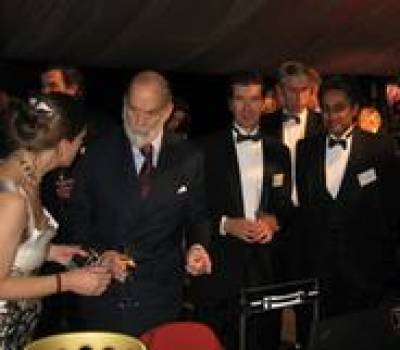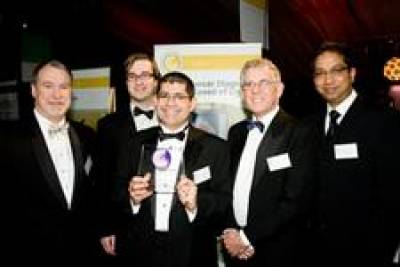Medical Futures Innovation Award 2008: three UCL winners
9 December 2008
Links:
 ucl.ac.uk/pathology/" target="_self">UCL Pathology
ucl.ac.uk/pathology/" target="_self">UCL Pathology
UCL has won two of seven categories in the 2008 Medical Futures Innovation Awards at a ceremony attended by 800 business leaders, medical and scientific experts and policymakers on 2 December.
The Cancer Innovation Award was presented to Professor Gareth Williams and Dr Kai Stoeber from UCL, and Dr Nick Miller-Jones and Lawrence Fenelon from UroSens Ltd (Cambridge), for their development of a point-of-care test for diagnosing bladder cancer. The test is non-invasive, may be much cheaper than existing tests and should reduce the need for cystoscopy in order to diagnose bladder cancer. Professor Williams and Dr Stoeber - both from UCL Pathology, the Wolfson Institute for Biomedical Research (Chromosomal Replication Group) and the UCL Cancer Institute - conducted the pioneering research underlying the technology behind this innovation, and are advising UroSens on the ongoing development of the bladder cancer test which will enter clinical trials in early 2009. With funding from Cancer Research UK and the Medical Research Council, Williams and Stoeber are also working on using the Mcm5 diagnostic test for the detection of oesophageal, pancreatic and prostate cancers. The MRC Translational Research Innovation Award was won by Moorfields Eye Hospital for the Moorfields Motion Displacement Test (MDT) for glaucoma detection, a software programme for assessing the field of vision to detect glaucoma. It offers the advantages of portability, affordability and potential accessibility through the internet, and takes only 90 seconds per eye to detect vision problems.
"We are all thrilled to have been given this award," says Dr Gay Mary Verdon-Roe, UCL Visual Neuroscience and glaucoma research fellow at Moorfields. "Glaucoma is the leading cause of irreversible blindness, but if the condition is diagnosed and treated early enough, blindness is preventable.
"We hope that our innovation will facilitate earlier diagnosis, and that winning this prestigious award will help to raise awareness of glaucoma and also give us the backing that we require to make the motion displacement test a reality." For more detail about this award please click here.

A team from UCL also won the 'Best Diagnostic Technology' award (part of the 'Cancer Innovation Awards' category). Mohammed Keshtgar from the Royal Free Hospital and Professor Stephen G Bown, Mr Santosh Somasundaram and Dr Martin Austwick from UCL created a medical device designed to speed up the diagnosis of breast cancer. Usually, during surgery, a lymph gland called 'the sentinel node' is taken from the armpit and tested for spread - if the test is positive, the patient will have to undergo a second operation. This new device, however, is an optical scanner which can be used in operating theatres during surgery. It allows for an instant assessment and, if need be, an immediate further surgical procedure - which obviates the need for the patient to undergo a separate, second operation at a later date. Its technology relies on light and elastic scattering spectroscopy which displays a different optical signature for cancerous and non-cancerous cells, and leaves the sentinel node intact for any other tests which may be required.

The Medical Futures Innovation Awards aim to discover the next breakthroughs in healthcare and overcome the challenge historically faced in the UK of being great at innovating, but poor at subsequently taking ideas to market. A unique feature of the Medical Futures process is the input from our esteemed judging panels, composed of over 80 leading medical, scientific and business experts. Each of the judges is keen to offer help and guidance to the up-and-coming innovators of tomorrow. As well as the critical recognition and endorsement of an award, winners receive a bespoke package of support to turn ideas into viable propositions that have credibility with investors. To date, past winners have secured over £80m of funding, and most importantly many have gone onto become successful services or products that are now changing peoples' lives.
Commenting on the winners, Mr Andy Goldberg, founder of Medical Futures, said: "The brightest and best of British medical and scientific talent have astounded us with their award-winning innovations that are so full of promise and have the capacity to transform patients' lives." He hopes that, even in the current financial climate, 'the winners will also win recognition from the business and investment community, to support their translation into commercially viable products, services and businesses."
In all, around a thousand ideas were submitted to Medical Futures for consideration in 2008.
Images
Top right: Professor Williams, Dr Miller-Jones and Dr Stoeber
Above (from left to right): Dr Gay Verdon-Roe, HRH Prince Michael of Kent, Mr Garway-Heath (Consultant Ophthalmologist and Moorfields MDT Research Lead), and Mr Ananth Viswanathan (Consultant Ophthalmologist and originator of Moorfields MDT software), with the test in the foreground.
 Close
Close

